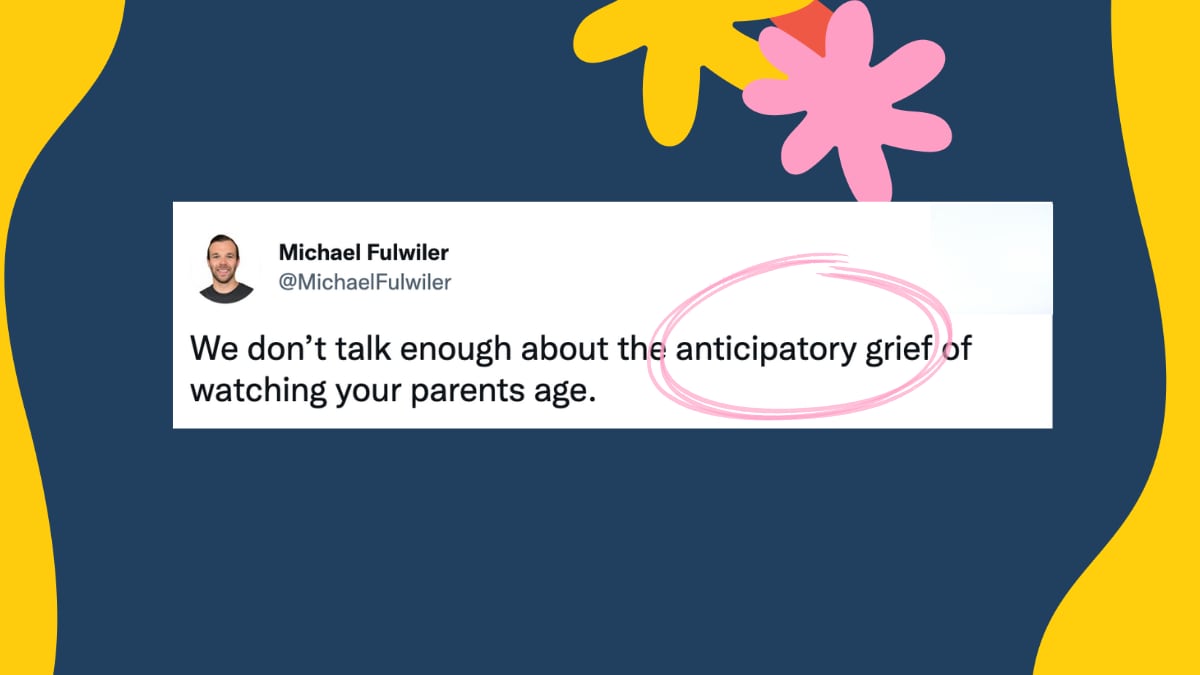Aging is a normal part of life, but that doesn’t make it easy. It can be difficult to get used to the idea that you are getting up there, and for a lot of people, it’s just as challenging — or perhaps even harder — to cope with the fact that loved ones are growing older, too.
As with many difficult topics, it’s not common to openly discuss the complicated feelings we often have about watching the people we love go through the aging process, but one viral tweet just proved why this much-needed conversation needs to be normalized.
“We don’t talk enough about the anticipatory grief of watching your parents age,” wrote Twitter user Michael Fulwiler.
Because this conversation topic is so rare, he may not have expected the kind of response his simple statement got. In just a few days, his tweet has been liked more than 146,000 times and retweeted more than 20,000 times. Additionally, thousands of people have responded with commiseration and gratitude that someone is finally giving voicing this tough topic.
“Been feeling this a lot the past couple years,” writes one person. “Hitting my 30s and seeing that my parents look noticeably older. It’s made me prioritize spending time with them, but it kind of feels weird because it does come at least partly from grief and not just joy.”
“I’ve been a caretaker for my almost 80-year-old dad for years now,” adds another Twitter user. “Years of anticipatory grief because he’s right in front of me, all the time. I see the changes. I try to remember everything he forgets. He is so much a part of my everyday, and I know one day he’ll leave me.”
What is anticipatory grief?
Anticipatory grief is actually a recognized condition. According to the University of Rochester Medical Center, anticipatory grief is similar to the normal mourning process, but it takes place while a loved one is still alive. People going through it may feel:
- Sadness.
- Depression.
- Regret.
- Fear.
They may also spend time imagining and worrying about what it will be like when their loved one isn’t a part of their lives anymore. The person who is aging or ill may also feel anticipatory grief about their own circumstances.
How people cope with anticipatory grief
The benefits of discussing anticipatory grief on a public platform like Twitter is that the conversation lets people know they aren’t alone and gives people a safe space to discuss how to work through their feelings. In the responses, many people shared support and advice based on their own experiences.
Talk it out
For some, aging creates an opportunity to have important and healing conversations they may not have had otherwise.
“I’ve lost both my parents in the last five years, [and] watching their decline gave me the opportunity to talk openly and honestly about their end of life, what they loved about their life and what they regretted,” one person writes. “It was an honor to do this. I hold their words in my heart.”
Make memories together
Others say leaning into these feelings of anticipatory grief has given them an opportunity to create and preserve important memories of their loved ones.
“I really value having recordings of my grandparents’ voices (who both died in 2001),” one person explains. “I’ve saved all my dad’s voicemails for a while now. I need to do some audio interviews though so I can have more than voicemails.”
“Ask them to tell you their stories again,” another person advises. “Even though you’ve heard them a hundred times. You’ll realize you have so much to ask them about after they’re gone.”
Prepare for the future
Many people said a silver lining of anticipatory grief is the chance to have important discussions about future care and end of life planning. These talks, while difficult, helped ease some of the anxiety both they and their loved ones felt about the future.
“My parents were relieved when I asked them what they wanted to do,” one person writes. “They had specific wishes and I made promises. When mom died of COVID everything was ready. 10 months ago my dad died. No extraordinary measures. He was most happy to read his obituary before he died. He felt heard.”
There is no easy way out of anticipatory grief or to avoid the eventual sadness we will feel at facing life without our aging loved ones, but this heartfelt and vulnerable conversation is proof of how vital it is to talk about these feelings. Aging, death and grief are a part of life for every person. It’s tempting to avoid these unpleasant realities but, as the many poignant and wise responses on Twitter prove, sharing these human experiences can help people move into these inevitable and difficult parts of life with more preparation, greater empathy and the understanding that they are never alone.



